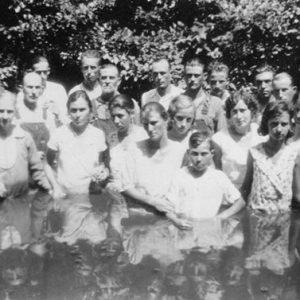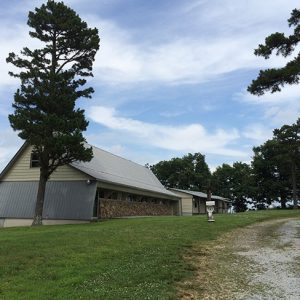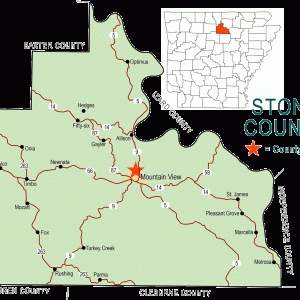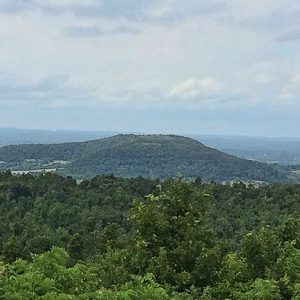calsfoundation@cals.org
Mozart (Stone County)
The community of Mozart is located between Timbo (Stone County) and Fox (Stone County) in Union Township of Stone County on Highway 263 near Lick Fork Creek. The hilly, wooded, rocky-soil terrain of the region attracted no permanent settlers until the passage of the Homestead Act of 1862. A few sturdy subsistence farmers trickled in and grew a few crops, mainly grain, along Meadowcreek and the Little Red River. The community that would eventually become Mozart developed as an extension of Timbo and Fox. The two cemeteries close to Mozart are the Ramsey and Roby cemeteries, with many tombstones bearing names of families living in Timbo and Fox.
The Mozart post office opened in 1926. Before it opened, mail was picked up at Timbo and other places. Edward J. Harper and his wife, Nancy Elizabeth, had the post office in their store for a time. Nancy Elizabeth Harper was appointed the first postmistress of the Mozart post office; it closed in 1959, with services transferred to Fox. According to Nola Morrison of Timbo, the Harpers’ foster daughter Lucille was the one who picked the name for the post office because she liked the musician Wolfgang Amadeus Mozart.
A different story about the origin of the community’s name relates to Dominikus Kocher and his brother, Achatz, who were born in Ramingstein, Tamsweg in Salzburg, Austria. They came to Rushing (Stone County) with their large families to homestead in 1904. Matthew Schiefer, a cousin, joined them in 1923. In 1928, he married Saly Kocher, daughter of Achartz. The Austrian immigrants submitted the name of beloved Austrian composer Mozart for the name of the new post office. In 1966, the immigrants also helped establish the first Catholic Church in Stone County, located in Mozart. The Kocher and Schiefer family plot is in the Fox Cemetery.
By 1925, the communities of the area—Fox, Meadowcreek (Stone County), Mozart, Parma (Stone County), Rushing, Sunnyland (Stone County), and Turkey Creek (Stone County)—had their own schools. The school in Mozart was called Skyland. In 1946, these sparsely populated settlements combined their educational offerings into one small school located two miles from Fox along Highway 263; the school was named Rural Special. Under Act 60 of 2004, it was forced to consolidate with the Mountain View (Stone County) district but was allowed to keep its own campus because of its isolation. The nonprofit Rural Educational Heritage Inc. began operating a preschool for children in the region in 2011.
The old Skyland school in Mozart was used by a Baptist group for a short time and then became the Skyland Pentecostal Church. The old building is still in Mozart on top of a mountain. Our Lady of Victory Church, the first Catholic Church in Stone County, was built in 1966 in Mozart overlooking the Timbo Valley. The Southern Baptists purchased Our Lady of Victory Church and began having services there as Skyland Baptist Church in August 1994. The Catholic congregation began attending the Catholic church in the more populated Mountain View.
Several towers dot the mountainous landscape around Mozart. Mozart has a television tower for AETN, Arkansas’s public television station. Bear Pen Falls near Mozart, with an elevation of 1,168 feet, is a popular fishing site for both fly fishing and bait casting.
Music is important for the Mozart area, but folk rather than classical. Fate Morrison was a popular fiddler; Fate Morrison Road runs near Mozart. He and his musical family are well known for their contributions to the early success of the annual Ozark Folk Festival in Mountain View in the early 1960s and later. He and other members of the Morrison family traveled with folk artist Jimmy Driftwood of Timbo, performing all over the world. Robert and Mary Gillihan, who are known for their singing and musical talents, live in the area. The Gillihans are a popular duo at the Ozark Folk Center. Shape-note singing has traditionally been popular in the churches around Mozart.
Today’s Mozart has no stores, no school, and no post office. The few who still live in Mozart journey to nearby Fox or to more distant Mountain View for shopping and services. Many who live in Mozart farm and raise livestock.
For additional information:
Fox, Arkansas, 1905–2005: Centennial of the Naming of the Post Office. N.p.: Fox Community Services Book Committee, 2005.
McNeil, W. K. “Singing and Playing Music in Arkansas.” In An Arkansas Folklore Sourcebook, edited by W. K. McNeil. Fayetteville: University of Arkansas Press, 1992.
Rushing, Phillip. “Early History of Rural Special School.” Heritage of Stone 4 (Fall 1980): 27–35.
Kenneth Rorie
Van Buren, Arkansas








My grandparents, Marcus and Mary Hubert, retired and moved from Chicago to Mozart in the late 1950s. My parents would make the drive with my brother and me in tow to spend two to three weeks there each summer. I have so many wonderful memories of our Arkansas vacations. I remember the store up the road from my grandparents’ house, with the stove in the middle of the floor and the old timers whittling away on their pieces of wood. I had fun playing with the May and Ross children. I remember when the post office operated out of the store, and then was relocated to Fox. My grandparents were friends with the Dodd family, and each summer during our visit, we would walk to their farm for a home-cooked chicken dinner. I even remember a ride on a flatbed truck along a narrow road to see their farm along the Red River. Prior to the building of Our Lady of Victory, for which my grandparents donated the land, we would attend mass in a small cabin. I was enthralled with the view in the new church. Father Micek was the visiting priest, whom I remember as a warm and kind person.